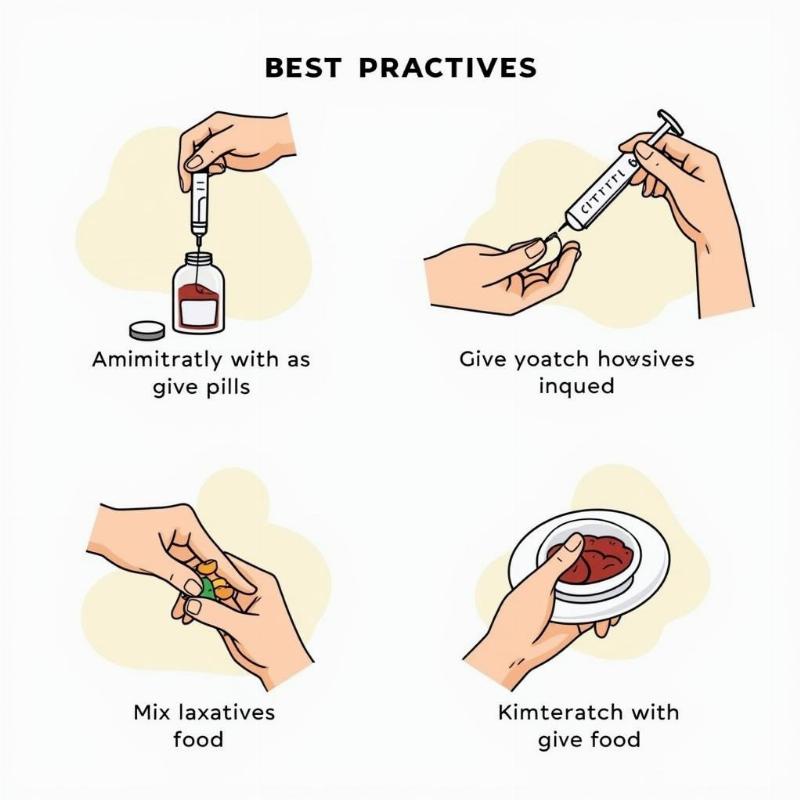Lax’aire is a common term pet owners encounter, often associated with digestive health. This comprehensive guide dives deep into what Lax’aire means for dogs and cats, exploring its benefits, potential risks, and how it fits into a holistic pet care approach in the US.
Understanding Lax’aire and its Purpose in Pets
Lax’aire typically refers to laxative products designed for pets. These products address constipation, a common issue affecting both dogs and cats. While there isn’t a specific product called “Lax’aire” widely recognized in the US market, the search term likely indicates a pet owner looking for a safe and effective laxative solution for their furry friend. Identifying the right product and understanding its function is crucial for responsible pet care.
Many factors, such as diet, hydration, and underlying medical conditions, can cause constipation in pets. Recognizing the signs of constipation, such as infrequent bowel movements, straining, and hard, dry stools, is the first step in addressing the problem.
Choosing the Right Laxative for Your Dog or Cat
Selecting the right laxative for your pet requires careful consideration. Several types of laxatives are available in the US, each with its own mechanism of action. Bulk-forming laxatives, osmotic laxatives, lubricant laxatives, and stimulant laxatives are among the common categories.
Consulting with a veterinarian is crucial before administering any laxative to your pet. They can diagnose the underlying cause of constipation and recommend the most appropriate type and dosage based on your pet’s individual needs and health status. Never self-medicate your pet, as incorrect usage can lead to adverse effects.
Safe Usage and Potential Risks of Laxatives for Pets
While laxatives can provide relief from constipation, using them responsibly and understanding potential risks is essential. Overuse or improper administration can lead to dehydration, electrolyte imbalances, and dependence. Follow your veterinarian’s instructions carefully regarding dosage and frequency.
 Safe Laxative Administration for Pets
Safe Laxative Administration for Pets
Natural Remedies and Preventative Measures for Constipation
Beyond laxatives, several natural remedies and preventative measures can support your pet’s digestive health. Ensuring adequate hydration is crucial. Providing a diet rich in fiber, including fruits and vegetables suitable for pets, can also promote regular bowel movements. Regular exercise also plays a role in maintaining healthy digestion.
When to Seek Veterinary Attention
If your pet’s constipation persists despite trying home remedies or if you notice other symptoms like vomiting, lethargy, or loss of appetite, seek immediate veterinary attention. These signs could indicate a more serious underlying medical condition requiring professional diagnosis and treatment.
Conclusion: Prioritizing Your Pet’s Digestive Health with the Right Approach to Lax’aire
Addressing constipation in your dog or cat involves understanding the potential benefits and risks of laxatives like those searched for under the term “Lax’aire.” Prioritizing preventative measures like proper hydration, a balanced diet, and regular exercise, alongside consulting with a veterinarian for appropriate diagnosis and treatment, are key to ensuring your furry friend’s long-term digestive health and overall well-being.
FAQ:
-
What are the signs of constipation in dogs and cats? Infrequent bowel movements, straining, hard, dry stools, and sometimes decreased appetite or lethargy can indicate constipation.
-
Can I give my pet human laxatives? No, never give your pet human laxatives. These can be toxic and cause serious health problems. Always consult with a veterinarian for appropriate pet-specific medication.
-
How often should my pet have a bowel movement? Most dogs and cats should have a bowel movement at least once a day.
-
Are there any natural alternatives to laxatives for pets? Increasing water intake, adding fiber to their diet with appropriate fruits and vegetables, and ensuring regular exercise can help prevent and alleviate constipation.
-
When should I take my constipated pet to the vet? If your pet’s constipation doesn’t improve with home remedies, or if they show other symptoms like vomiting or lethargy, consult a veterinarian immediately.
Beautdogs.us: Your Trusted Source for Dog Care Expertise
Beautdogs.us is your one-stop shop for all things dog-related in the United States. We offer expert advice on dog breeds, care, and products, catering to both new and seasoned dog owners. From breed-specific guidance to the latest in canine health, Beautdogs.us provides reliable information to help you navigate the joys and challenges of dog ownership. Contact us for personalized support and expert advice: Email: [email protected], Phone: +1 501-555-7529.